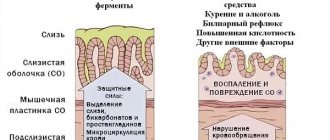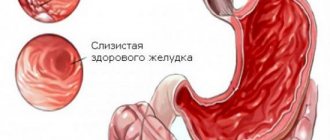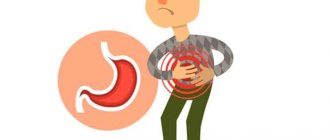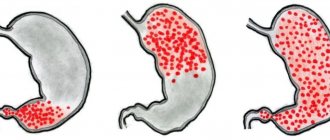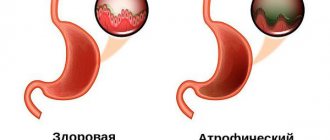Video text
In this episode of the TV show “Live Healthy!”
with Elena Malysheva you will learn about the symptoms and treatment of gastritis. Lemon air flavoring. Useful properties of cocoa. Gifts that improve memory. One of the most important medical discoveries of the twentieth century was the cause of gastritis, ulcers and even stomach cancer.
Two Australian scientists have found that gastritis and stomach ulcers are caused not by stress or nervous disorder, but by the microbe Helicobacter pylori. To prove he was right, one of the scientists, Barry Marshall, drank a solution of cultured bacteria, and after some time he developed an ulcer. Subsequently, it was proven that Helicobacter can also cause cancer. For this discovery, scientists were awarded the Nobel Prize, and modern medicine has developed a completely different approach to the treatment of peptic ulcers and gastritis.
Test: Do you experience hunger pain or pain immediately after eating in the stomach area?
What happens Once in the stomach, Helicobacter completely colonizes the mucous membrane of the stomach and duodenum. This is a microbe that is characterized by aggressive spread in the mucous membrane. Helicobacter pylori changes acid formation and causes chronic inflammation. And where there is chronic inflammation, it is not far from malignant changes. It is the presence of bacteria that does not allow a person to completely get rid of the disease. The second cause of ulcers and gastritis is irritation of the stomach walls with hydrochloric acid. Normally, the gastric mucosa is protected. It has a thick layer of mucus that protects the walls from the aggressive action of gastric juice and acid. But if the mucus layer is disrupted due to the action of microbes, then the hydrochloric acid released in the stomach will have an irritating chemical effect and lead to increased inflammation and cell death.
How to treat Nowadays, stomach ulcers are no longer a surgical disease; they can be easily treated with medications. Helicobacter pylori, like other microbes, is fought with antibiotics. It is possible to completely get rid of Helicobacter in 80-85% of cases, this is a highly effective treatment. The course of treatment is 7-14 days. Hydrogen pump inhibitors (hydrochloric acid blockers) are also prescribed simultaneously with antibiotics. Formula of hydrochloric acid HCl. It is H, active hydrogen, that is dangerous.
The “Live Healthy” program with host Malysheva allows patients suffering from gastritis to identify this disease, determine the symptoms and eliminate it in order to live calmly and healthy. To find out the reasons that cause pain in the stomach, the patient is initially sent for examination, which includes gastroscopy. The occurrence of gastritis is possible even in people who do not abuse alcoholic beverages or smoke. There are many factors that cause this disease, as Malysheva assures.
The development of chronic gastritis is associated with the appearance in the stomach of the bacterium Helicobacter pylori, which penetrates the gastric mucosa, causing its inflammation. As a result of this process, a person experiences hunger pains. If stomach pain occurs, Malysheva recommends undergoing a gastroscopy procedure in a timely manner to ensure that the diagnosis is correct - this is the basic method of examination for gastritis. The “Live Healthy” program with Malysheva includes an examination of the patient to identify a certain type of disease, and invited medical specialists provide explanations of the possible causes and symptoms of this disease.
The “Live Healthy” program with Malysheva explains the fact that the appearance of gastritis cannot be provoked only by eating fatty, fried, salty and smoked foods, as well as stressful situations, but these factors can aggravate the current situation and increase pain. The most significant symptoms of gastritis are pain that occurs on an empty stomach and disappears after eating, as well as the presence of heartburn. Malysheva in the “Live Healthy” program assures that the development of this disease can be facilitated by long-term use of non-steroidal and anti-inflammatory drugs, smoking, and if the examination reveals the bacterium Helicobacter pylori, then it must be removed from the stomach. This can be done with the help of antibiotics and the drug Bismuth, which envelops the gastric mucosa, and secretory drugs will help normalize the balance of hydrochloric acid, since an acidic environment promotes the proliferation of bacteria and the development of gastritis. The “Live Healthy” program states that eliminating the disease is possible only with proper and timely treatment.
Elena Malysheva about gastritis and peptic ulcers
Elena Malysheva, the country's chief television doctor, could not ignore the topic without discussing it in the program “Live Healthy.”
In modern society, every tenth adult knows from personal experience what a stomach ulcer is. Elena Malysheva, the country’s chief television doctor, could not ignore the topic without discussing it in the program “Live Healthy.”
Stomach ulcer - what causes this gastroenterological disease? Most people interviewed by the TV presenter consider stress, alcohol, the environment, spicy and fatty foods to be the causes of the disease.
Dr. Malysheva thinks completely differently. Stomach ulcers, in her opinion, are caused by the pathogenic microorganism Helicobacter pylori. In the “Live Healthy” program, an ulcer is presented as an intestinal infectious disease that can be contracted in several ways:
Fecal-oral infection. The causative agent of gastric disease is excreted from the body with feces, and enters it through the oral cavity from unclean hands, dirty food and water, less often through saliva or vomit. Iatrogenic infection (caused by medical personnel). The bacterium is transmitted through unsterilized medical instruments during diagnostic examinations (gastrofibroscopy) and other manipulations. In the “Live Healthy” program, Elena Malysheva told and showed clearly how a pathogenic microorganism, when it gets on the gastric mucosa, covered with many folds, damages it.
Digestive function is the main function of the stomach. To do this, the organ continuously produces hydrochloric acid, which breaks down food. At the same time, mucus is secreted, protecting the walls of the organ from acid burn. When the integrity of the mucous membrane is damaged, the acid gets on the resulting defect and forms an ulcer. Without timely treatment, the ulceration deepens into the walls of the organ, forming a through hole.
In the program “Live Healthy,” Elena Malysheva claims that after scientists discovered the microorganism Helicobacter pylori, stomach ulcers ceased to be a surgical disease.
Peptic ulcer disease is effectively treated with conservative drug therapy. The antiulcer treatment regimen must include antibiotics and proton pump inhibitors.
In the all-about-food section of one of the “Live Healthy” programs, Elena Malysheva talked about one of the favorite fruits of Russians - the banana. This sweet treat contains beneficial substances that kill Helicobacter pylori bacteria.
Acute gastritis and the reasons for its development
One of the most common reasons is the introduction of microbes into the body along with food (experts talk about salmonella, shigella, staphylococcus and helicobacter).
Aggressive chemical compounds, such as acid with alkali and alcohols (for example, ethyl, in a concentration of more than 20%), including medications, that is, glucocorticosteroids and NSAIDs, also become provocateurs of acute gastritis.
The condition in question can also appear after influenza, diphtheria, kidney or liver failure, or as a consequence of injury if a foreign object gets into the stomach. In some cases, the disease is a manifestation of a food allergy, for example, to strawberries or chocolate.
Malysheva about the causes of gastritis
The “Live Healthy” program with Malysheva includes an examination of the patient to identify a certain type of disease, and invited medical specialists provide explanations of the possible causes and symptoms of this disease. Clear ideas about the causes of chronic gastritis have developed relatively recently, after the discovery of the bacterium Helicobacter pylori . It has become obvious that these bacteria, colonizing the gastric mucosa, are the causative agent of the most common type of gastritis - gastritis with high acidity of gastric juice.
Causes of chronic gastritis also include:
- repeated and prolonged eating disorders;
- eating spicy and rough foods;
- addiction to hot food;
- poor chewing, dry food;
- consumption of strong alcoholic drinks;
- long-term uncontrolled use of medications that have an irritating effect on the gastric mucosa (salicylates, butadione, prednisolone, some antibiotics, sulfonamides, etc.);
- occupational hazards (lead compounds, coal, metal dust, etc.);
- endogenous intoxications due to kidney diseases, gout (in which the gastric mucosa secretes urea, uric acid, indole, skatole);
- hereditary predisposition.
Nonspecific signs of gastritis
Before taking action against the anomaly in question, you need to know how to distinguish it. True, without additional diagnostic methods based only on clarifying complaints, this is quite difficult (especially on your own). Be that as it may, a person should be alerted to pain (aching, dull, sharp, strong or weak). Lack of appetite can also indicate health problems.
In addition, you should not ignore nausea and vomiting, heartburn, flatulence, bloating and heaviness in the abdomen. Some people feel a taste in their mouth. Experts call problems with stool a common occurrence. Increased salivation and anemia cannot be ruled out. But the listed signs are not among those that define gastritis of the stomach, that is, it will not be possible to identify the disease symptomatically.
As for specific symptoms, they appear during an exacerbation of a chronic disease and include nausea and vomiting, pain, and abnormal digestion. With persistent gastritis, these phenomena are a classic option.
Health and Living Healthy with Elena Malysheva
Issue dated June 3, 2014 When doctors make a diagnosis of atrophic gastritis, they should be wary.
This is a serious disease that is a harbinger of cancer. Doctors will tell you today which symptoms should make you see a doctor. You will also learn how to treat atrophic gastritis. Atrophic gastritis is a depletion of the mucous membrane when the surface of the stomach has become thin.
The hero of the program has gastritis and suffers from frequent heartburn. Since childhood, the man has suffered from chronic gastritis. Gastritis has nothing to do with nutrition and vitamins. The walls of the stomach have folds and villi inside.
Gastritis is an inflammatory process of the gastric mucosa. Over time, the constant inflammatory process makes the mucous membrane thinner. If the inflammation process lasts for years, the folds of the stomach straighten, the mucous membrane is thin and painful.
Atrophic gastritis is considered a precursor to stomach cancer. Symptoms of gastritis include: heartburn, pain in the pit of the stomach - in the upper abdomen. Anemia occurs because iron is not absorbed, causing weakness and brittle hair.
A person who has such complaints should go for a gastroscopy. During gastroscopy, the doctor will see gastritis, ulcers, and Helicobacter will be detected. It is Helicobacter that causes inflammation of the gastric mucosa.
The microbe is killed with antibiotics; they are prescribed for 2 weeks. You need to take proton pump inhibitors, these drugs will reduce acidity. There are bismuth preparations. They also kill microbes, they envelop the mucous membrane.
We remind you that the summary is only a brief summary of information on this topic from a specific program; the full video release can be viewed here Live Healthy: Issue dated June 3, 2014
Share the link on social networks!
Rate this post: (No votes) Loading ..
Attention! We are not the official website of the programs. For all questions related to the programs, write to Elena Malysheva’s website www.zdorovieinfo.ru or to the first channel www.1tv.ru. If you came across this text not on the website www.zdorovtv.ru, then it was stolen
Methods of treatment for acute gastritis
First of all, wash the stomach by drinking several glasses of water or saline. After this, you need to induce vomiting. It is important to repeat the procedure until food particles disappear from the vomit. For about a day after cleansing, it is recommended to fast and drink only warm tea, rosehip decoction with mint, chamomile or plantain, oats, yarrow. Non-carbonated mineral water is suitable.
The diet after 24 hours should be gentle: slimy soups with omelettes, pureed porridges, meat or fish soufflé, jelly. Gradually, you can include savory bread with dairy products and boiled vegetables on the menu, and after seven days, experts allow you to switch to a normal diet.
Drugs such as cerucal and motilium will help stop nausea and vomiting. Platyfillin and papaverine will cope with the pain. But use antibacterial therapy only if the infection is severe. This toxic infection is best treated with the help of doctors in a hospital. If the causative agent of gastritis is Helicobacter, eradication (the procedure for destroying Helicobacter pylori in the gastric mucosa) cannot be avoided.
Acute gastritis and medications
Only a doctor should prescribe medications, focusing on the course of the disease, but in general, complex therapy often includes antacids, antispasmodics, anticholinergics, and enterosorbents. Next, we will consider the funds included in each group.
Antacids include medications designed to neutralize hydrochloric acid. As a rule, they prescribe:
— non-absorbing almagel is a complex agent that acts not only as a neutralizer, but also as an adsorbent and cytoprotective drug;
- non-absorbing gastracid - it differs from other drugs from this group in that it almost does not cause a repeated increased production of gastric juice;
- Gaviscon non-absorbent - this antacid is fast-acting, reduces irritation of the gastric mucosa and prevents the onset of reflux;
- rhenium absorbent - the medicine also works quite quickly and should protect the gastric mucosa;
- absorbent tams - in addition to neutralizing free hydrochloric acid, it reduces the activity of gastric juice peptides;
- phosphalugel is non-absorbent - adsorbs and envelops.
Anticholinergics that reduce the production of hydrochloric acid include:
- gastrocepin, which is a selective blocker of muscarinic receptors and increases the pH of the stomach;
Issue dated October 28, 2015: how to treat gastritis according to Malysheva
The cause of gastritis is often the bacterium Helicobacter. If you experience stomach pain, then you are at risk.
Let's talk about gastritis, this is a common disease. The heroine of the program had erosive gastritis. But the woman was treated only with diet; she was never prescribed antibiotics or tests for Helicobacter. Gastritis is one of the most common stomach diseases. People usually complain about pain. The mucous membrane of the stomach becomes inflamed. The mucous membrane becomes red, there may be erosions, ulcers, and even stomach cancer may develop.
Medicines for gastritis
Gastritis is often caused by the bacterium Helicobacter. It is the bacterium that causes inflammation in the stomach. There may be heartburn and nausea. If erosive gastritis is not treated, there will be an ulcer. Helicobacter causes not only ulcers, but also stomach cancer.
60% of the population is infected with this bacterium. The condition is treated with an antibiotic. Sometimes proton pump inhibitors are prescribed. It is very important to do a test for bacteria, gastroscopy. Sometimes gastritis occurs in smokers and those who take non-steroidal anti-inflammatory drugs.
Basic measures for chronic gastritis
Experts warn that in 90% of cases the cause of the development of chronic gastritis is the Helicobacter bacterium, the remaining 10% are due to such variants of chronic gastritis as radiation, autoimmune, eosinophilic and lymphocytic, granulomatous and giant hypertrophic. That is why the first thing to do is to undergo a study to determine whether the bacterium is in the body and in what quantity. During the repeated examination, gastric juice is analyzed with daily Ph-metry.
If it is discovered that the phenomenon has become chronic, eradication is prescribed for ten days, which is carried out using special drugs several times a day. During an exacerbation with high or normal acidity, medications are recommended that will reduce acidity in the stomach and help the mucous membrane to recover. In this case, the hydrogen pump blocker omeprazole will be included in the eradication scheme.
Instead, you can use H2-histamine blockers - ranitidine and famotidine. For some time, to reduce pain and heartburn, you can take the above antacids (meaning Almagel with Gastal, Maalox), anticholinergics (atropine, metacin) or combination drugs (for example, Vikalin, Roter).
For normal digestion with reduced acidity, so-called replacement therapy is used, that is, gastric juice is used (can be replaced with hydrochloric acid or acidin-pepsin) and multienzyme drugs, such as enzistal, penzital, abomin. If there is nausea and vomiting, cerucal with cisapride and domperidone are well suited.
What can a doctor do?
The symptoms of chronic gastritis are not specific enough. Therefore, diagnosis and treatment of this disease should be carried out by a qualified gastroenterologist. To clarify the diagnosis and determine the form of chronic gastritis, additional examinations are carried out:
- ultrasonography;
- esophagogastroduodenoscopy - visual examination of the upper digestive tract using a gastroscope - a fiber optic tube that transmits an image to a monitor;
- biopsy of the gastric mucosa;
- study of gastric secretion distinguishes chronic gastritis with increased and decreased secretion of gastric juice.
You may also have a blood test to check for anemia, a blood test to check for antibodies to Helicobacter pilori, a stool occult blood test, an abdominal x-ray, and other tests.
Treatment of chronic gastritis consists of four main components:
- diet;
- prescribing medications that normalize the acidity of gastric juice;
- prescribing drugs that restore the gastric mucosa;
- antibacterial therapy (if infection with Helicobacter pilori is confirmed).
Features of nutrition for gastritis
Proper nutrition is an important part of treatment, so it is extremely important to follow some recommendations (this way you will be able to avoid relapse of the disease). For example, gastroenterologists advise:
- eat little and often in small portions, since this will not lead to the production of excess acid, plus, the digestion process will be easier, practically without irritating the walls of the stomach;
- chew food slowly and thoroughly so that it is moistened with saliva and crushed to the maximum, which means it is digested faster and does not injure the stomach;
- drink more water (6-8 glasses a day), allowing the body to cleanse itself and better process food;
- try to stick to the same time of consumption of food, as this will teach the body to produce acid immediately before eating;
- minimize everything that stimulates the release of acid, awakens the appetite outside the main meals, or irritates organ tissue (we are talking about fried, sour, spicy foods, dry crispy cookies, chips, alcohol);
- process foods well - in this way you can not only help the stomach digest dietary fiber, but also avoid parasitic infections (preference is given to boiling or baking);
— pay attention to the temperature of the food (not too hot or cold food is welcome);
- remember to wash your hands (according to some data, Helicobacter pylori can spread from person to person through skin-to-skin contact).
Products for chronic gastritis
Experts prescribe diet (table) No. 1 and its variations depending on how severe the illness is. In general, permitted and prohibited products can be identified. For example, carrots with beets and potatoes, cauliflower and broccoli are approved. You can have green peas, as well as some finely chopped parsley and dill. The allowed fruits are apples, bananas, nectarines, apricots, and peaches. Watermelon and melon, raspberries and strawberries can also not be ignored.
White rice, oatmeal, buckwheat and semolina are healthy. Vermicelli, low-fat cheeses, fermented baked milk, cottage cheese, cream, milk, plus, unsalted butter, vegetable (refined) and melted butter are allowed. Meats include turkey, boiled chicken (without skin), veal, beef, and rabbit meat. Eggs are cooked in any form, but not fried. In addition, sturgeon caviar, low-fat liver pate, doctor's and milk sausages are recommended. As for sweets, here you can choose honey, confiture, jam, pastille, dry biscuits, soft buns, marshmallows.
Herbal medicine for gastritis
Before using herbal medicine as a treatment method, it is important to take into account the characteristics of the disease. When acidity is high, a decoction is best made, for example, from linden and mint leaves in a 1:1 ratio. By mixing the roots of calamus with licorice and fennel fruits in 2 parts each, you can also prepare an excellent infusion.
In addition, flax seeds with alder sulfur (3:1) are good; licorice roots with elecampane, valerian and calendula flowers - 2:2 and marshmallow root - 3 parts. Dandelion with calamus roots, chamomile and calendula flowers, one part of St. John's wort and mint and two parts of plantain leaves will cope with low acidity. To help, wormwood herb with celandine, dill fruits - 1 part, dandelion root, calendula flowers - 2 parts, cudweed - 4 parts, oat seeds and rose hips - 7 parts.
To relieve inflammation of the stomach, enhance the secretory activity of its glands, normalize acidity and give a choleretic effect, you should use agave (aloe vera, which is two to four years old). The juice of the plant (it is not watered for 3-4 days before cutting the leaf) should be taken 2-4 weeks, half an hour before meals, a teaspoon. In addition, chamomile relieves inflammation and pain well, and also promotes the normal excretion of bile. Plus, stomach cells recover much faster under the influence of this plant. The drink is prepared according to the standard recipe and consumed 30 minutes before meals, 2-3 tbsp.
Rosehip is a natural storehouse of anti-infectious vitamin C. Its fruits improve the body's ability to resist diseases, strengthen blood vessels, and quickly restore gastric cells. To make an infusion, you need to take 1 tablespoon of the fruit and pour hot, not boiled water (200 ml) in an enamel container (the container is covered with a lid and heated for a quarter of an hour in a water bath). After about 45 minutes of cooling the composition at room temperature, you can begin filtering and squeezing the remaining raw materials. The remaining infusion is supplemented with boiled water up to 200 ml to drink after meals twice a day.
But peppermint will have a calming effect, eliminate stomach spasms, dilate blood vessels, help cope with nausea and vomiting, relieve pain and, due to its choleretic effect, help improve digestion. The method of preparing the infusion does not have any special features, but it should be taken warm three times a day 15 minutes before meals, a third of a glass. Dry leaves are suitable for tea (as an additive).
Treatment
Treatment of chronic gastritis is primarily aimed at ridding the patient of the cause that caused it - be it an infection or a systemic disease. Medications typically come in combination with a diet that will help reduce inflammation, soothe a sore stomach, and promote repair and healing of damaged tissue. Depending on the condition causing gastritis, your doctor may prescribe the following medications:
If gastritis is in the acute stage and relief is needed right away, the doctor may suggest the patient take antacids
Medicines to regulate stomach acid levels. These are proton pump inhibitors, which suppress the activity of acid-producing cells in the stomach (omeprazole, lansoprazole, rabeprazole, pantroprazole, esomeprazole), as well as H2-blockers (ranitidine, famotidine, cimetidine). It is worth remembering that high doses and long-term use of proton pump inhibitors in the treatment of chronic gastritis can increase the risk of fractures, so the doctor may prescribe additional calcium supplements to strengthen bones.
Antacids. If gastritis is in the acute stage and relief is needed right away, the doctor may suggest the patient take antacids. They neutralize stomach acid and can quickly relieve pain from chronic gastritis. True, depending on their active substance, there may be side effects - constipation or diarrhea.
The doctor may also recommend changing the analgesic to one that is less harmful to the stomach; for example, aspirin to paracetamol.
Surgery. In particularly severe cases, surgery may be required when the surgeon removes the affected areas of tissue. As a rule, this operation is performed in case of irreversible tissue damage by infection in order to prevent its spread.
Sources
https://www.1tv.ru/shows/zhit-zdorovo/syuzhety/chto-vazhno-znat-o-svoem-zheludke-zhit-zdorovo-fragment-vypuska-ot-25-05-2017
https://health.mail.ru/disease/gastrit/
https://gastritinform.ru/portall.zp.ua/video/elena-malysheva-simptomy-gastrita/id-5B1l61Alb94.html
https://gurushealth.ru/bolezni-simptomy-lechenie/zheludochno-kishechnyj-trakt-22/713-zhit-zdorovo-malysheva-o-gastrite.html
Post Views: 1,721
Lifestyle with gastritis of the stomach
During an exacerbation, when vomiting and nausea may occur, you need to eat small portions every 4-5 hours. No snacks, alcohol or cigarettes. Replace alcoholic drinks with fermented milk ones, and it is better to forget about smoking as a habit, since the toxic products released during the combustion of tobacco, getting into the stomach mucosa with saliva, irritate it. Blood circulation is disrupted not only in the stomach, but also in the body itself. No matter how modern the methods of treating gastritis may be today, it is easier to practice a healthy lifestyle as an excellent prevention against many diseases than to undergo long-term treatment later.
Elena Malysheva about gastritis and its treatment
Program “Live Healthy” from 11/06/2010: Stomach. Gastritis and ulcer
Before the New Year, some medical problems are especially worth paying attention to. For example, ulcers and gastritis
Test yourself. Do you suffer from gastritis?
If you experience hunger pain, discomfort or pain immediately after eating, then you should consult a gastroenterologist.
Bitterness in the mouth is a sign that bile has entered the esophagus.
Bitterness in the mouth is a sign of gastritis
One of the most important discoveries of the past century is that the causes of gastritis, ulcers and stomach cancer were discovered. It turned out that the problem is not stress and nervous disorders, but the microbes that live in the stomach.
Two people received the Nobel Prize for this - Barry Marshall and Robin Warren. Marshall took a container of liquid containing these microbes - they are called Helicobacter pilare - and drank it. He developed an ulcer. It was an experiment akin to the experiments of the 15th century. So it was proven that these microbes cause ulcers and cancer.
Once these microbes appear, they colonize the entire duodenal mucosa. These are microbes that are characterized by aggressive spread in the mucous membrane. They change acid production, they cause chronic inflammation. And where there is chronic inflammation, there is malignant transformation.
Hylacobacter pylori is the culprit of peptic ulcer disease. Its presence does not allow one to completely get rid of the disease.
If you have stomach pain, get examined by a gastroenterologist
In addition to this microbe, there is also acid. The gastric mucosa is normally protected - there is a special thick layer of mucus that protects it from the aggressive action of gastric juice and acid, among other things. If mucins - mucous proteins - are removed, the released hydrochloric acid will have a local irritating chemical effect and lead to increased inflammation and cell death. The acid finishes the terrible job that the microbes started.
An ulcer today has ceased to be a surgical disease. She is well treated with medications. The microbe is killed by antibiotics. Getting rid of it occurs in almost 80% of cases.
Treat gastritis and stomach ulcers with antibiotics
The course of treatment ranges from 7 to 14 days.
Now there is a large group of drugs that for a long period of time turns off the formation of hydrogen ions, and therefore the flow of hydrochloric acid into the stomach. Such drugs (hydrochloric acid blockers) are prescribed in parallel with antibiotics. They last from 12 to 24 hours and can be used once a day.
Question: How to distinguish gastritis from an ulcer by the nature of the pain? Answer: Ulcers can be asymptomatic, and gastritis can be very violent, but if the pain is persistent and its intensity is high, then the likelihood of an ulcer is greater than gastritis. Only acute gastritis can give a violent clinical picture: vomiting, intoxication.
source

